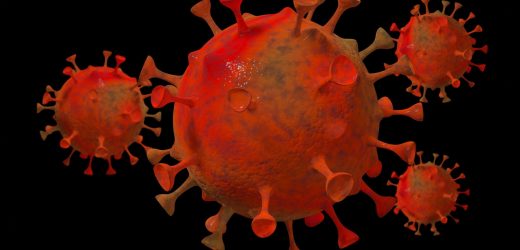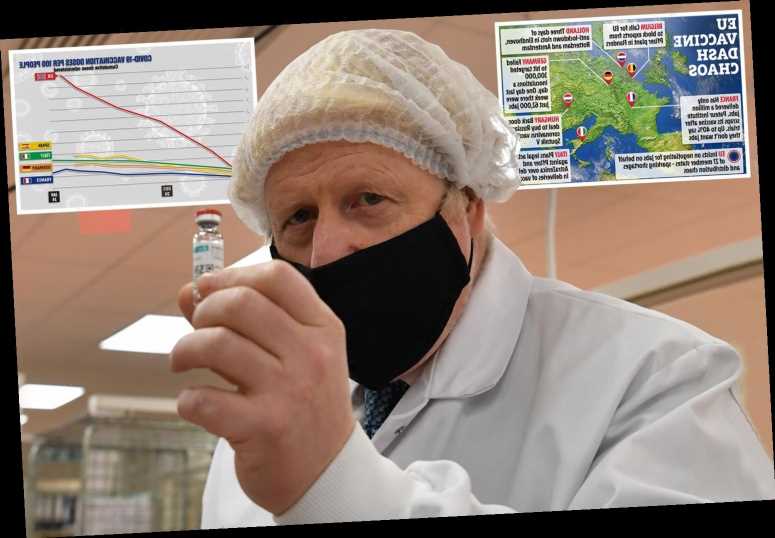THE South African coronavirus variant is up to 50 per cent more infectious than the original strain, an expert has warned.
Professor Tulio de Oliveira and his team have been tracking the spread of the mutation, named 501YV2, around the country.
? Read our coronavirus live blog for the latest news & updates
The virologist said their results show that it is around 50 per cent more transmissible than previous Covid lineages.
He added: "The estimated increase in transmissibility of the 50Y.V2 (B.1.351) is similar to the B.1.1.7 (501Y.V1) that was first identified in the UK."
Public Health England revealed yesterday that 90 cases of the mutant South African Covid strain have now been detected in the UK.
Prof de Oliveira's team at the KwaZulu-Natal Research Innovation and Sequencing Platform (KRISP) were the first to identify the mutation.
It came after staff at one of main hospitals in Nelson Mandela Bay began noticing an unusual surge of new cases from the middle of November.
VIRAL SURGE
Prof de Oliveira told Sky News: "They were convinced that there was probably something different about the virus so we answered their call very quickly."
They began extracting genetic material from the variant and closely studied how it was spreading across the country.
Their results showed that it was more contagious than the UK's variant.
Meanwhile KRISP's sister-organisation, the Africa Health Research Institute (AHRI), also made a worrying discovery.
What Covid strains are in the UK?
The Health Secretary Matt Hancock revealed in mid-December that a new coronavirus variant was spreading in the UK, having emerged in Kent in September before rapidly spreading in the south.
This variant, called VUI 202012/01, has swiftly become dominant in the UK and has been largely blamed for the so-called "third wave".
Mr Hancock then revealed the new South African strain had entered the UK in late December.
It is thought that 90 Brits have contracted the strain so far – however these cases were picked up from random samples, so it could be the case that infections of the variant are much higher.
Experts have previously warned the South African variant can't be picked up by testing – a person carrying it would test positive, but the test cannot distinguish if they have the new variant, or an older version.
The Prime Minister Boris Johnson then revealed on January 13 the Government was "concerned" about a new Brazilian variant.
Two variants have been identified in Brazil; the first has a small number of mutations and between nine and 11 confirmed cases of this variant have been identified in the UK.
The second, which has been detected in Manaus and travellers arriving in Japan, has not been detected in the UK.
Antibodies which people had developed in response to the original strain of Covid were "much less able" to neutralise the South African variant.
It means that people who've already had coronavirus are at risk of catching it again.
Prof de Oliveira said his team had seen "multiple samples" of this viral re-infection as neighbouring states started carrying out similar analyses.
'MORE DEADLY'
It comes after British scientists warned the South African variant may be more deadly than the original strain.
Experts on the New and Emerging Respiratory Virus Threats Advisory Group (Nervtag), who feed into the government advisory group SAGE, have been analysing the mutation.
They said earlier this week that data showed “a hint of increased mortality”.
But they cautioned there has not been detailed research into the mortality of the South African variant, as there has been with the Kent one, so they cannot be confident in the finding.
To work out if a new strain is truly more deadly, scientists have to do a “controlled” study, where they control for factors that may skew the results.
Speaking at a virtual Science Media Centre briefing earlier this week, Nervtag member Prof John Edmunds, London School of Hygiene & Tropical Medicine, said: “In terms of looking at the other variants, we have done some analysis on the South African variant.
“There may be a hint of increased mortality. But we haven't been able to control… this is just doing analysis from a long way away.
“First of all, it's just a hint. Secondly, that is just looking at it very crudely, rather than what we've done here in the UK where we have matched people very carefully, with the new strain.
“That's the kind of study that has to be done to determine if there is an increased risk of death associated with the South African or Brazil variants, and that has not been done as far as I am aware. I've seen no data at all along those lines.”
Prof Peter Horby, chair of Nervtag, University of Oxford, said: “Obviously we have very detailed data on our patients in the UK strain, we just don't have access to data in South Africa or Brazil so we have much less clarity about those viruses.”
What are the two different Covid strains from Brazil?
There are two new coronavirus variants emerging in Brazil, with one causing more concern than the other.
The variant that has led to the banning of all flights from South America has not been detected in the UK, while the other mutation has, but is of little concern.
So, what do we know about the new variants?
Brazil variant 'causing concern' (P1)
The Brazilian variant (P1) has three key mutations in the spike receptor binding domain (RBD) that largely mirror some of the mutations experts are worried about in the South African variant.
The coronavirus RBD is one of the main targets for our immune defences and also the region targeted by vaccines. Changes within this region are therefore worrisome.
Experts detected the new variant circulating in December in Manaus, north Brazil.
It is not yet known if the mutation causes more severe Covid-19, but evidence suggests it may be more transmissible.
Porton Down scientists are conducting more analysis to confirm evidence that indicates the strain does not cause any higher mortality rate or that it affects the vaccines or treatments.
It was detected in Brazil and in travellers from Brazil to Japan, and contains a unique constellation of lineage defining mutations.
Like the South African variant, the Brazilian one carries a mutation in the spike protein called E484K, which is not present in the UK strain.
The E484K mutation has been shown to reduce antibody recognition, helping the virus to bypass immune protection provided by prior infection or vaccination.
Scientists analysing the Brazilian variant say the mutations it shares with the South African variant seem to be associated with a rapid increase in cases in locations where previous attack rates are thought to be very high.
They say it is therefore essential to rapidly investigate whether there is an increased rate of re-infection in previously exposed individuals.
The other Brazilian variant (P2)
This one has been detected in the UK, but experts say it is no cause for concern.
It has been reported to be spreading in the Rio de Janeiro State, and is associated with two independent reinfection cases in Brazil, according to the Covid-19 Genomics UK (Cog-UK) consortium.
While it also carries the E484K mutation, it is not currently considered sufficient to designate it as a "Variant of Concern".
This variant (P2) does not contain the other important mutations carried by the more concerning variant (P1).
According to Cog-UK, although some cases of the P2 have been detected in the UK, other variants with this mutation have also been observed.
Cog-UK said that as of January 15, 11 cases of the variant had been detected in the UK.
Analysis of both variants is ongoing
Cases of the South African variant detected so far were picked up from randomly studying samples, so it could be the case that infections of the variant are much higher.
Nine cases have been blamed on a new variant from Brazil, according to the Health Secretary Matt Hancock.
Another Brazilian variant, detected in Manaus and travelers arriving in Japan, has not been diagnosed in the UK.
The government has attributed sky-high infection rates that led to the third lockdown in part to the new variant first identified in Kent, which is now prevalent across the UK and the rest of the world.
'EVADING TESTING'
Experts in the UK have also previously warned that the variant may also be capable of evading testing.
It makes it much harder to track how many cases of the South African strain there truly are, scientists say, but not impossible.
By comparison, the other new and rapidly spreading strain that emerged in the UK can be distinguished with testing, and so can be tracked in "real time".
The PCR test – used as the "gold standard" worldwide to diagnose Covid-19 – looks for three genes of the coronavirus called the S gene, the N gene, and the ORF1ab gene.
The new UK strain, which emerged in Kent, has deletions in the S gene.
As a result of this, test results that show only two genes indicate the person is carrying the new UK strain, whereas if all three genes are present, the person is carrying the "original strain".
The problem with the South African strain is that it also has all three genes.
Dr Simon Clarke, an associate professor in cellular microbiology at the University of Reading, told The Sun: "On that standard PCR, you will not be able to distinguish between the South Africa strain, and the strains that have been doing the rounds for months already.
"That's why its more difficult to track."
The only way to grasp how many people have been infected with the South African strain is to use genetic sequencing.
Scientists already sequence a fraction – 10 per cent – of PCR tests in order to analyse what strains are in circulation.
Dr Clarke said: "They would only pick it [the South Africa variant] up if someone goes for the normal testing procedure because they have symptoms, and they hit that one in ten chance of their strain being sent for sequencing. That is the only way the authorities would know about it.
"That's a slower way, and less refined way, of doing things because there would be a time lag.
"If you have an outbreak of the South Africa strain, you have to wait till you've got the sequence data.
"With the PCR data with the Kent strain, you get a much quicker picture of what is happening."
Source: Read Full Article







